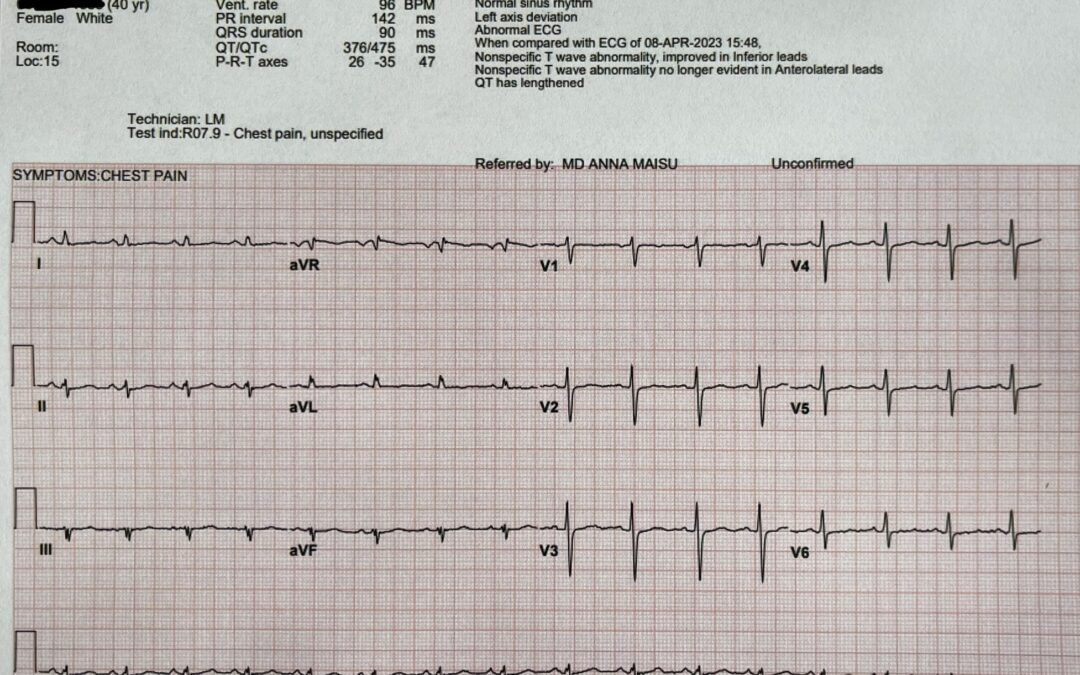Six months after I was supposed to have a follow-up appointment with a cardiologist, it was finally my turn. It had been pushed back by the office four times with four different reasons. In the meantime, I had a TIA and a stroke. All my doctors have been anxiously awaiting to get a cardiologist’s opinion, hoping I’d be seen before another incident. Me too.
List of questions in hand, I did my best to make myself presentable, opted for the walker instead of the wheelchair, and managed to make it on time thanks to an open handicap parking spot. Everyone in that office is pleasant from the front desk to the nurse who administered the EKG. I joked with them all, hoping it might help to hide my nerves.
Before I knew it, the cardiologist blew through the doors. He’s a traveling physician, like the last one I saw the previous August. Our hospital wouldn’t run without them, but nothing peaks my anxiety more than meeting a new doctor, especially at an appointment as important as this one.
It was over almost as soon as it started. “I’m ordering a heart monitor, a bubble contrast echocardiogram, and a stress test,” he said. Wait, what? I’d had all those within the last year and wondered how to tell him nicely without sounding like a know-it-all. I venture, “So, you think it’s important to repeat those to see how things might have changed in the last year? Or because I had a stroke?” Yep.
But wait, theres more. “Actually, I think you should have a heart catheterization, or angiogram instead of a stress test,” the doctor continued. “It’s the best way to get the clearest picture of what’s really going on.” I nod my head in agreement like a robot without emotional capacities.
The heart monitor will be put on right then and there. The doc wants the results and labs before the procedure which, by the way, “could cause another stroke.” Lupus sounds likely; it causes blood clots. The list of heart symptoms is worrisome too, along with the results of previous heart tests.
Running through my mind was the thousands of heart patients Todd has helped over the years. Their first step is the cardiologist. After an unfavorable angiogram, they’re referred to a heart surgeon who eventually operates with Todd’s help. I always pictured his patients as much older than me. I mean, I’m only 40. How am I on this diagnostic train?
Before today, the process was all so academic-sounding. It’s not that I didn’t care; I did. I was glad Todd helped people, and on the rare occasion things didn’t go well, I hoped and sometimes said a quick prayer for their recovery. I knew the basic mechanics of his job, but this is different.
This is my body. This doctor, who I met for five minutes max, is going to go into my arteries, all the way to my heart, while I’m unconscious. He may or may not go through my wrist or leg. He may or may not place a balloon or stint. I may or may not have to stay overnight. I can’t help but wonder if I may or may not wake up. If I do, will it be after another stroke?
The pre-op form says specifically that I can’t eat (trigger #1) or take the very two medicines (triggers #2 and #3) that prevent paralytic attacks. Oh boy. A complication before the procedure even starts. I manage the briefest explanation I can of hypokalemic periodic paralysis and hope the nurse understands why those medicines are vital to my survival.
Nothing is ever simple with me, and I pity the nurse who has to try to explain this through the channels of command to get me an exception. It’s times like these that I wish I fit into the boxes of the American healthcare system. There are no boxes for medical zebras.
Heart monitor attached, instructions given, and I’m getting ready to leave when the nurse says something about my “abnormal EKG today.” Hold on. What? It was 10 seconds long, max and this is the first I’ve heard of it. I think fast and manage to get a copy on my way out of the door. It’s an agonizing four hours before Todd’s able to look at it.
I’ve stopped sleeping again. The cumulative weight of events keeps my mind spinning at night, no matter how tired my body might be. I’m really scared this time. Keeping my thoughts and feelings to myself protects people I care about from worrying about me. I’m told I’m strong, so shouldn’t I be able to handle it? But the dam is beginning to break.

Laura you are not weak and it is alright to be scared. I would be to. You need prayer and you know I will be praying. Please keep me updated. I love you more than you will ever know. ????❤️
Praying for you friend.
This sounds serious and complicated I just pray for wisdom for the Doctors and trust the Lord to protect you during the procedure.
Laura, you are amazing and inspirational. I’m thankful to call you friend! It’s ok to be fearful and overwhelmed at times. You need to rest in all the prayers being said for you. So many love you and are praying desperately for you, never forget that.
Praying for you, friend! It’s normal to be afraid. Read the Psalms- full of real and true fears for health and safety. But also full of reassurances and comfort for those who are afraid. I have recited Psalm 23 while in the hospital, and also have meditated on this verse “In peace I will both lie down and sleep, for You alone, O Lord, make me dwell in safety.” (Psalm 4:8) May God comfort you as you lie down to sleep and restore your soul!